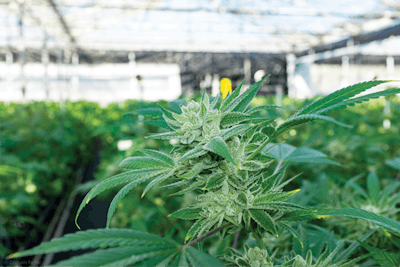

Editor's Note: The original version of this article was published July 1. This version has been updated with more information.
Following Gov. Gavin Newsom’s signing of a $308-billion state budget on June 30, California’s weight-based cannabis cultivation tax was eliminated effective July 1.
The cultivation tax, which imposed a $161-per-pound rate on licensed growers (regardless of the current market value of cannabis), was abolished via Assembly Bill 195, which was attached as a trailer to the state budget.
For Graham Farrar, co-founder and president of Glass House Brands, a Santa Barbara-based cannabis operator with more than half a million square feet of cultivation space, A.B. 195 is in line with one of two main changes being advocated and echoed among the state’s license holders: "Less taxes, more retail."
“It’s huge,” Farrar says of killing the state’s cultivation tax. “You can charge a premium for licensed product because nobody prefers ‘bathtub gin,’ right? I think we’d all rather have licensed product, but there’s only so much premium people are willing to pay. Less taxes narrows that gap … so the licensed growers have a chance to be competitive with the folks who aren’t paying taxes.”
The tax reform included in the legislation will help brace the licensed industry, California Cannabis Industry Association (CCIA) Executive Director Lindsay Robinson says in a statement to Cannabis Business Times.
“The survival of the regulated industry is vital to providing ongoing tax revenues for the state and the advancement of public health and safety,” Robinson says. “Eliminating the cultivation tax is just one step towards stabilizing our industry, but it’s an important one.”
California’s cannabis cultivation tax, which had been in effect since the state first launched adult-use sales in 2018, has generated approximately $500 million in state revenue: According to data from the California Department of Tax and Fee Administration (CDTFA), the cultivation tax has generated nearly $468 million through March 31, 2022, with $32.7 million generated in the first quarter of this year alone.
But by eliminating the cultivation tax, many industry advocates argue the state’s total revenue from cannabis will continue to grow by way of greater participation in the legal market through less-burdensome policies that incentivize entry—both by growers and consumers.
A six-part study published May 4 in a 42-page report by Los Angeles-based Reason Foundation, a nonprofit libertarian think tank, suggests eliminating the cultivation tax, with no other changes to the state’s tax structure, would still generate roughly $145 million in total monthly revenues by December 2024, while keeping the cultivation tax would generate $152.8 million—roughly 5% more.
That $145 million in the Reason Foundation’s projected total monthly tax revenue for December 2024 represents a 48% increase from the average total monthly tax revenue of $98 million generated in the first quarter of 2022, according to CDTFA data.

In addition to eliminating the cultivation tax, A.B. 195 moves the collection of the state’s 15% cannabis excise tax to the point of sale by Jan. 1, 2023, and puts a freeze on that excise tax rate for three years.
After three years, A.B. 195 allows state officials to revisit the excise tax and adjust the rate to what they estimate will generate an amount of revenue equivalent to the amount that would have been collected had the cultivation tax not been eliminated. However, in no case can the cannabis excise tax exceed 19% of the gross receipts of retail sale, according to the bill.
“By consolidating the state’s cannabis taxes into a single excise tax imposed at the point of retail sale, the state can tax the entire cannabis supply chain—from cultivation to sale—in a manner that is more efficient and transparent, thereby lowering barriers to entry into the legal, regulated cannabis market,” language from the bill states.
While Robert Groesbeck, co-CEO of Planet 13 Holdings, which operates both cultivation and retail facilities in California, says “any relief is certainly welcome,” more reform is needed to compete with the illicit market.
“California has been challenging for quite some time. We’ve seen some tax relief here recently on the cultivation side of things and the excise tax, but it’s going to take a long time to see the benefit from that, and in the meantime, you got an incredibly robust, illegal market you’re competing against every day,” Groesbeck says.
“I think the state could probably do a lot more to provide relief to the retail customer,” he adds. “There are pretty onerous taxes at the register, and that’s why people gravitate to the illegal market when that happens.”
The cultivation tax had been a larger barrier to entry for outdoor growers, in particular, who were taxed at higher rates because their product does not command as much on the wholesale market compared to greenhouse or indoor growers.
For instance, if a greenhouse grower endures a $160 cultivation tax for a pound of cannabis that wholesales at $1,000 per pound, and an outdoor grower endures the same $160 cultivation tax for a pound of cannabis that wholesales at $500 per pound, then the tax burden would be 16% for the greenhouse grower and 32% for the outdoor grower.
Mendocino County native Jared Schwass, who practices law in the cannabis space as the founder of California-based Schwass Law Firm, says the new law will help small-scale growers, too.
“The elimination of the cultivation tax is a huge win for small and homestead farmers in this highly regulated and highly taxed industry,” he says. “Hopefully, this will provide relief to the farms that have been struggling in the legacy cannabis-growing regions of California.”
Schwass also congratulates the advocates and stakeholders who have fought hard to cancel out the tax.
“Enjoy and celebrate the win, but this is just the beginning,” he says. “There are several other reforms needed, but this is a big step in the right direction.”
While the bill is not perfect, according to a CCIA news release, zeroing out the cultivation tax indefinitely and shifting the excise tax collection to retail are “big wins” for the state’s licensed cannabis industry.
“This bill represents genuine tax reform,” Tiffany Devitt, vice president of the CCIA Board of Directors and chief of regulatory affairs for CannaCraft, says in a statement to CBT. “Whether it is sufficient to transition the majority of consumers from the illicit to the licit cannabis market remains to be seen. Nonetheless, we commend and thank the legislature and governor for making substantial progress.”

























